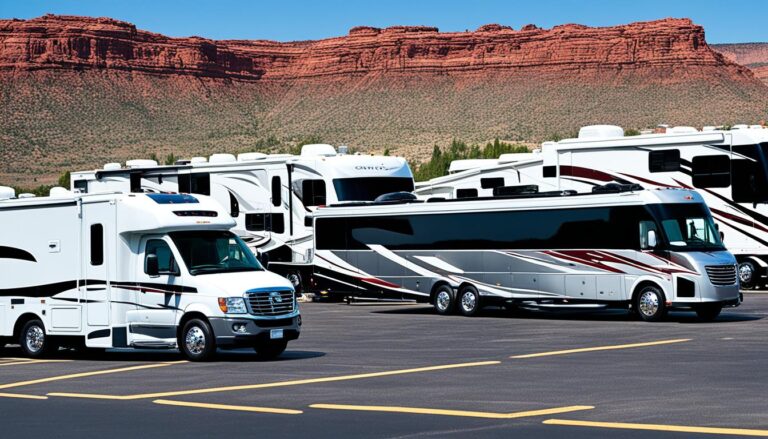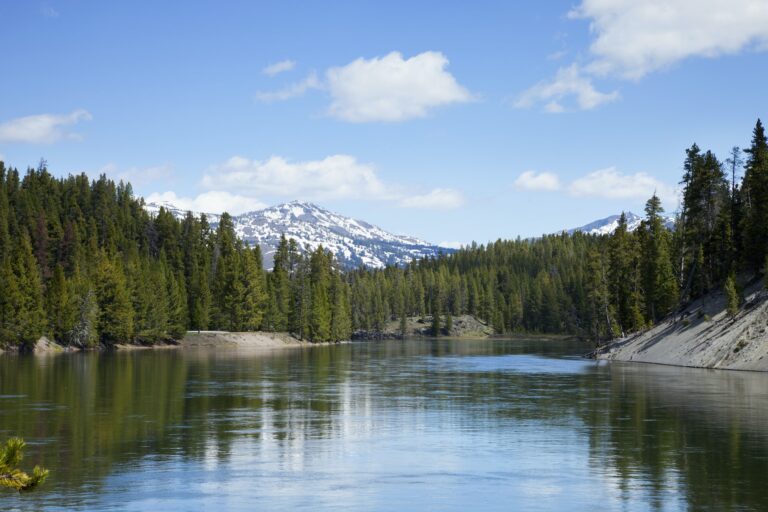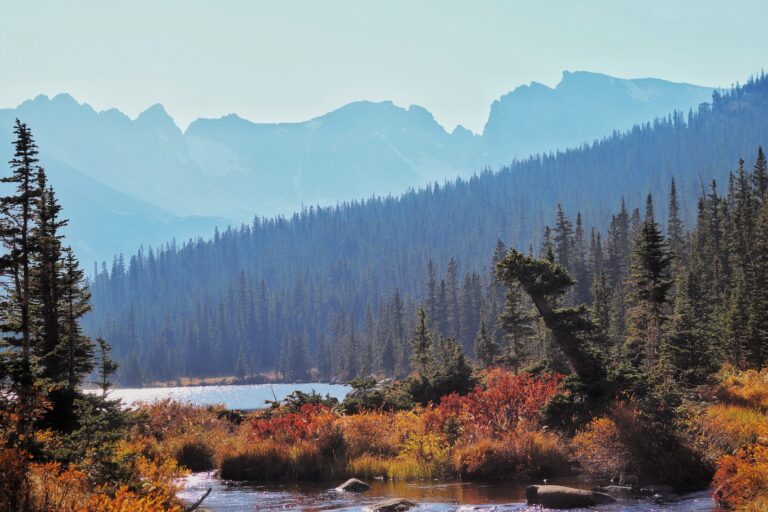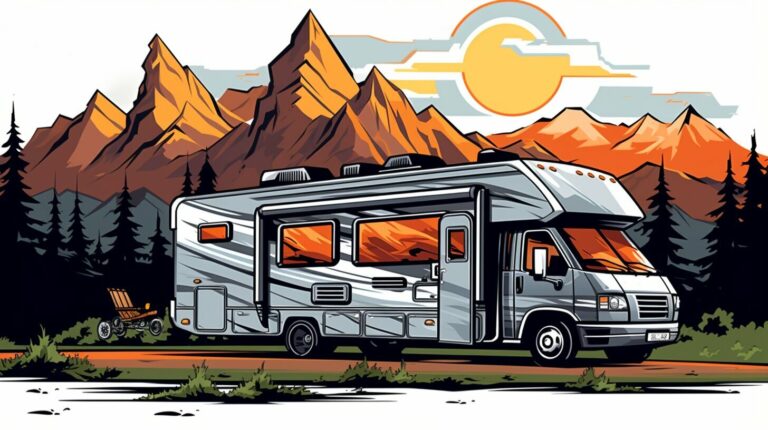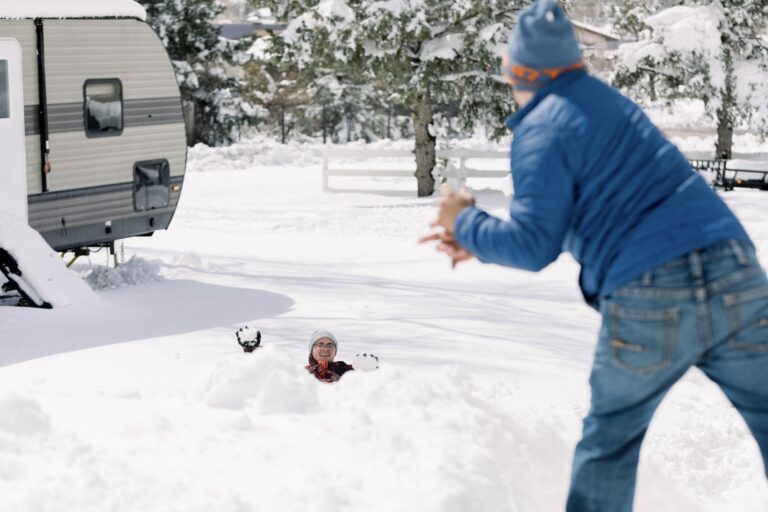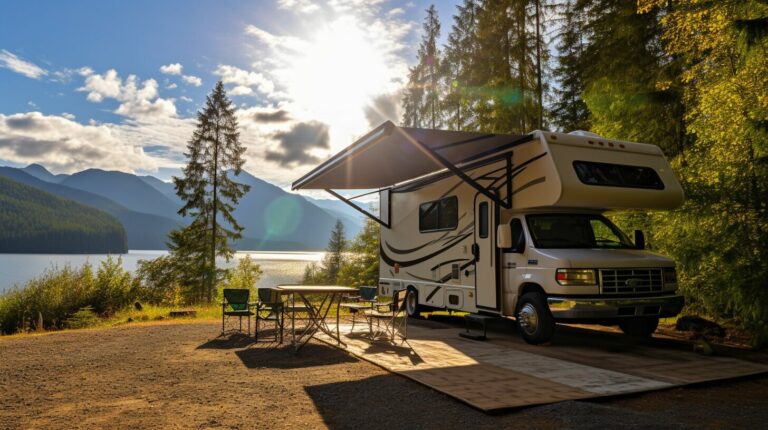Starting your RV journey means you get to see incredible places and enjoy the freedom of the road. One exciting part is finding places to park for free overnight, called “boondocking.” This guide will show you many spots where you can do just that. From Walmart to beautiful public lands, this info will help you travel with more freedom and money in your pocket.
Key Takeaways
- Discover a variety of free overnight parking options for your RV, including Walmart parking lots, truck stops, rest areas, national forests, and dispersed camping areas.
- Learn how to research boondocking locations and understand the regulations to ensure a safe and enjoyable experience.
- Explore the benefits of embracing the boondocking lifestyle, including cost-savings and the opportunity to immerse yourself in nature.
- Understand the importance of practicing responsible boondocking etiquette, such as adhering to Leave No Trace principles and being mindful of noise and light pollution.
- Connect with the vibrant RV community and learn from fellow boondockers to enhance your overall RV experience.
Introduction: Embracing the Freedom of RV Life
Starting an RV lifestyle leads to a unique sense of freedom and adventure. It doesn’t matter if you’ve been doing it for years or just started. Knowing where to find free spots to park overnight is a game-changer. It can save you money and let you dive into the real RV life.
An RV gives you the chance to be your own boss, change plans on a whim, and see stunning outdoor spots. Finding free spots to park doesn’t just lower costs. It gives you more cash for the fun stuff. You could park at Walmart or find a quiet place to camp alone. For those ready to explore, the options are limitless.
Picture yourself on a big road trip or maybe just a short break. The RV life lets you break free and find adventure everywhere. Boondocking is the key. It saves cash, gets you close to nature, and lets you meet fellow RV lovers. These memories will stick with you forever.
“The joy of the RV lifestyle is not just about the destination, but the journey itself. By embracing the freedom of free overnight parking, you unlock a world of exploration and self-discovery.”
Ready to learn about boondocking benefits and top places? These tips will make your RV travel better and deeper. Let’s get started!
Where Can RVs Park Overnight for Free
The RV lifestyle offers the chance to travel and see new places without being tied to hotels. Fortunately, several places welcome RVers to park for free. This saves you money and lets you travel longer.
Walmart Parking Lots: A Convenient Option
Many Walmart stores allow RV overnight parking. This is a great option, offering safety and some amenities, like restrooms. Make sure to know their rules before staying, though, as some may limit how long you can park there.
Truck Stops and Rest Areas: Safe Havens for RVers
Along highways, truck stops and rest areas can be handy for a night’s rest. These places have what you need – fuel, food, and restrooms. But, always check for any parking limits or rules to follow.
| Parking Option | Amenities | Considerations |
|---|---|---|
| Walmart Parking Lots |
|
|
| Truck Stops and Rest Areas |
|
|
Using these free parking spots lets you visit more places and save on camping fees. It’s important to follow the rules at each stop. This ensures everyone has a good, safe time.
National Forests and Bureau of Land Management Lands
National forests and Bureau of Land Management (BLM) lands are wide and beautiful. They offer lots of free spots for RVers to stay. You can find places to park your RV for free and be in nature. This lets you save money instead of going to regular camps.
The United States Forest Service manages national forests. They are huge wild areas across the country. Great for national forest boondocking, they let you visit beautiful places for free. You don’t have to stay in crowded campsites.
BLM lands are managed by the Bureau of Land Management. They cover a big part of America. These lands are perfect for blm land boondocking. You can enjoy being alone in nature with your RV, away from big crowds.
Are you into tall pine trees or rough BLM terrains? These spots are great for a cheap and fun time in nature. Do some research and you’ll find the best spots for your RV. Then, just enjoy the beautiful natural surroundings.
To have the best experience, learn the rules for each place well. And always follow the “Leave No Trace” rules. This is important for keeping nature beautiful for everyone to enjoy.
“The best thing about national forests and BLM lands is the sense of freedom and adventure they offer. You can truly disconnect from the world and connect with nature in a way that’s simply not possible in a crowded RV park.”
| National Forests | Bureau of Land Management Lands |
|---|---|
| Managed by the U.S. Forest Service | Administered by the Bureau of Land Management |
| Cover millions of acres across the country | Make up nearly a fifth of the total land area in the U.S. |
| Offer dispersed camping for national forest boondocking | Provide numerous opportunities for blm land boondocking |
| Provide a sense of wilderness and solitude | Offer a rugged and remote camping experience |
Exploring National Forests and BLM Lands
For great national forest boondocking and blm land boondocking, do these things:
- Learn the rules for the place you want to visit.
- Find designated spots for camping. They are usually safer and have more facilities.
- Be ready to take care of yourself. These spots often don’t have regular services.
- Follow the “Leave No Trace” rule to protect the environment. This way, others can also enjoy these beautiful places.
By taking on the challenge of national forest boondocking and blm land boondocking, you’ll make great memories. And you’ll feel closer to nature.
Dispersed Camping Areas: Immersing in Nature
Dispersed camping is also called dry camping or boondocking. It lets RV fans park in wild areas on public lands. You can stay in these remote spots and feel connected to nature in a deep way.
Finding Dispersed Camping Sites
Looking for the right dispersed camping area is fun. You might find them in national forests, BLM lands, or some parks. These places often let you camp for free, with some rules to follow.
Look for marked spots to camp or places others have clearly used. You can also use websites or apps to find great camping spots.
Etiquette and Leave No Trace Principles
Dispersed camping requires you to be extra careful. By following Leave No Trace, you make sure the land stays beautiful. Always take your trash with you and don’t change the campsite’s natural look.
- Pack out all trash and waste, including food scraps and biodegradable items.
- Use established fire rings or fire pits, and always extinguish campfires completely before leaving.
- Respect wildlife by keeping a safe distance and avoiding feeding them.
- Maintain a low profile and minimize noise and light pollution to preserve the serene ambiance.
With the right manners, you can enjoy the wild and keep it beautiful. This way, others can get to enjoy it in the future too.
“The best thing one can do when it’s raining is to let it rain.” – Henry Wadsworth Longfellow
Dispersed camping means you can leave the noise of the city behind and connect with nature. By camping responsibly, you make sure these places stay special.
City Street Parking: Urban Boondocking Adventures
Rural boondocking spots are common, but urban boondocking is an exciting alternative. In some places, like certain cities, you might be allowed to park your RV on city streets overnight. This lets you enjoy a city’s culture and save on staying elsewhere.
City street RV parking brings both good and tough parts. It’s great for diving into a city’s life and being close to fun and food. But, finding a legal and safe spot for the night in a city needs careful thought and checking.
Navigating City Street Parking Regulations
Before you start your urban boondocking journey, know the local rules well. Not every city is open to RVs staying on their streets. Some places have special times when you can park, or other rules. Make sure you know these to avoid problems.
- Look at the city’s website or call the local office to learn about parking and RV stay rules.
- Always pay attention to signs about parking times. Breaking these rules can lead to fines or your RV being towed.
- Try to find parking areas made for RVs. They’re often safer and more convenient.
Embracing the Urban Boondocking Lifestyle
When you’re urban boondocking, being a good RV owner matters a lot. Be good to the people who live there, keep quiet and clean, and follow the leave no trace idea. This makes the experience better for you and makes RVers and locals like each other more.
Doing city street RV parking can have its own set of issues, like less space, noise, or safety worries. To manage, be ready to adjust your RV and plans to fit the city. Stay open to adventure and exploration, the things that probably attracted you to this way of life.
By getting to know about urban boondocking, you make your RV life richer. You can be right in the middle of a city, enjoying its life, while still loving the freedom and low cost of RV living.
Planning Your Boondocking Trip
Starting a boondocking trip means carefully planning for a fun time off the grid. Success comes from good research and being ready for anything.
Researching Locations and Regulations
To get started, look up places where you can park for free overnight. Places like National Forests, BLM lands, and local parks might allow this kind of camping. Make sure you check the rules, like time limits and permits, for each spot.
You should also look into local laws for overnight RV parking. Cities may have their own rules about where you can stay. Knowing the rules helps you avoid problems later.
Essential RV Boondocking Gear
Having the right gear in your RV is key for a good off-grid trip. Think about items like:
- A dependable power source for keeping batteries ready
- Enough water and a way to make it clean for drinking and washing
- Ways to manage waste properly, like tanks and composting toilets
- Fun outdoor items, including an awning, chairs, and a grill
With proper planning and the right equipment, you’re set to enjoy living off the grid.
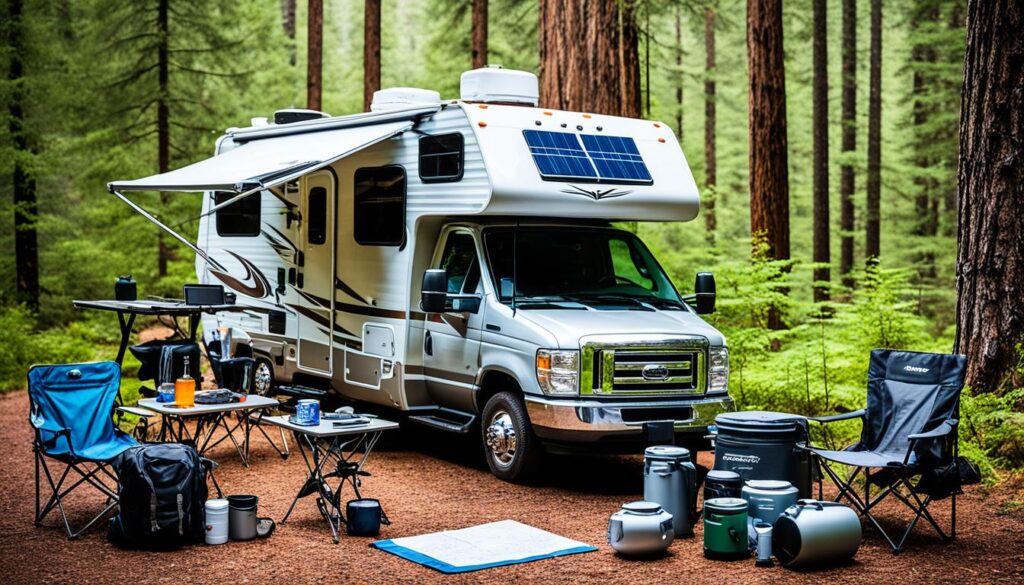
| Boondocking Gear | Description | Importance |
|---|---|---|
| Solar Panels | Portable or roof-mounted solar panels to generate renewable power | Ensures a reliable power source for your RV’s electrical needs |
| Water Storage | Large water tanks or portable water containers to store clean water | Provides access to water for drinking, cooking, and sanitation |
| Waste Management | Black water tank, composting toilet, and portable waste containers | Allows for responsible disposal of waste, preventing environmental impact |
| Outdoor Living Accessories | Awnings, camp chairs, grill, and other items to create a comfortable outdoor living space | Enhances the overall boondocking experience by providing a cozy outdoor setup |
Safety Considerations for Free Overnight RV Parking
Keeping your rv safety in mind is key when boondocking. Think about your safety and that of your RV when choosing a free spot for the night.
For safety, look for places that are well-lit and busy, like Walmart lots or rest areas. Avoid far-off places where you might not be safe.
- Check how safe and easy to reach the spot is, such as the lighting and nearby services.
- Learn about any rules or restrictions so you don’t break the law.
- Know the area’s layout; make sure you can safely park and leave with your RV.
Your RV’s condition and its equipment are also important. Make sure everything works well. This includes your power system, water and waste storage, and a reliable power source.
| Safety Essentials for Boondocking | Recommended Equipment |
|---|---|
| Electrical System | Surge protector, backup batteries, solar panels |
| Water and Waste Management | Fresh water tanks, gray/black water tanks, portable toilet |
| Emergency Preparedness | First-aid kit, fire extinguisher, emergency lighting |
Always be alert about your rv safety when boondocking. This way, you can enjoy the adventure of free RV spots worry-free and safely.
Building Community: Connecting with Fellow Boondockers
The RV community is famous for its friendliness and shared love for adventure. By connecting with boondockers, you can pick up new tricks and make friends who support you. This brings more fun and helps you learn as you travel in your RV.
Want to meet more boondockers? Join the online forums and social media groups. These places are full of advice, like where to camp for free and live off-grid ideas. You’ll also learn about events where you can meet others and swap stories.
Don’t forget the magic of talking to fellow boondockers you meet on your journey. Maybe at a rest stop, Walmart, or a beautiful campsite, you could find new friends. These talks are more than just small chats. They could be the start of a strong friendship or teach you new things.
“The RV community is like a big family – always there to lend a helping hand or share a campfire story.” – Sarah, full-time RVer
When you make friends with boondockers, your circle grows. You also get a lot of insider tips and support. The boondocking community is rich with knowledge and help for RV lovers like you.
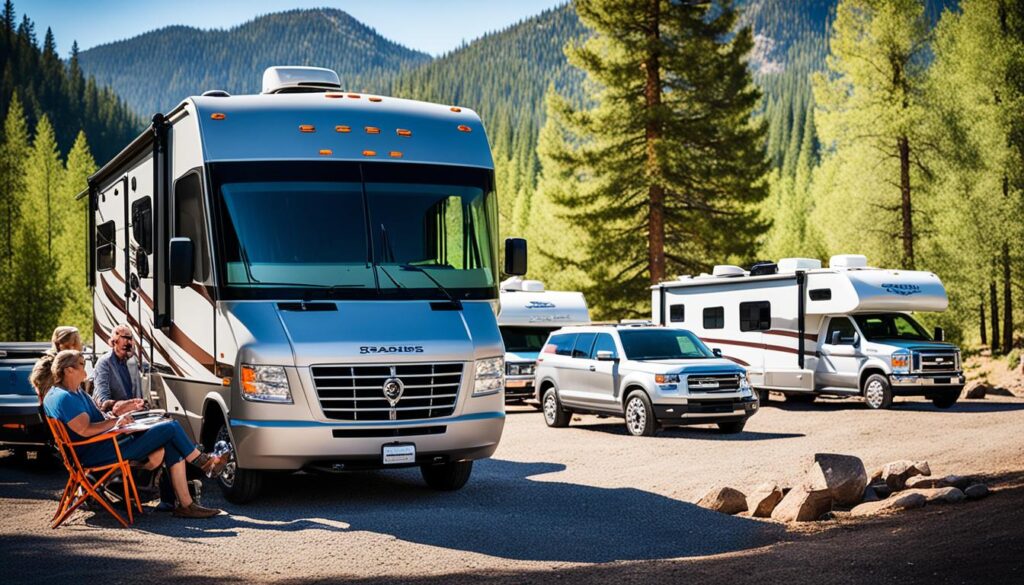
So, jump into the RV community with both feet. New friends and adventures could be just around the next turn.
Boondocking Etiquette: Respecting the Land and Others
When you go boondocking, follow good manners for the land and others. It’s important to keep places clean and not disturb wildlife. By being mindful of your trash and being quiet, you protect these lands for future use.
Leave No Trace Principles
Learning to camp responsibly starts with the Leave No Trace way. It means keeping your camping impact very low. Be sure to live by these seven key rules:
- Plan Ahead and Prepare: Learn about where you’re going, pack right, and know the rules.
- Travel and Camp on Durable Surfaces: Use official camp spots or surfaces that won’t get hurt.
- Dispose of Waste Properly: Take your trash with you. Handle human waste and gray water the right way.
- Leave What You Find: Enjoy nature’s beauty but don’t take anything from it.
- Minimize Campfire Impacts: Try not to build fires. If you do, put it out totally before you leave.
- Respect Wildlife: Watch animals from a distance. Don’t feed or bother them.
- Be Considerate of Other Visitors: Keep quiet and the lights low. Think about how you might affect others and the area around you.
Noise and Light Pollution Awareness
When boondocking, be aware of how you affect the area. Noise and light pollution can disturb the environment and other campers. Limit generator noise, keep music soft, and use lights that don’t shine too far at night.
“The true art of camping is learning to live in harmony with the natural world around you, leaving it as pristine as you found it.”
By following boondocking etiquette, you help keep wild spaces open and clean. This way, others in the future can enjoy them just as much.
Cost-Effective RV Living: Embracing the Boondocking Lifestyle
Living in an RV and enjoying the boondocking lifestyle is a smart way to save money. It lets you cut costs by avoiding campground fees. This means you can use that money for more travel. You get to see more places and extend your RV journey.
Boondocking means camping in open spaces without hookups. It’s not just about saving money. This way of life lets you enjoy the peace and beauty of nature. It’s a chance to get away from the rush of daily life.
The best part is, boondocking takes you to unique, hidden places. You’re not tied to regular campgrounds. You can find untouched nature and spectacular views. It’s a thrilling way to explore the world.
| Benefit | Description |
|---|---|
| Reduced Costs | By avoiding campground fees, you can save significant amounts of money, allowing you to extend the duration of your RV travels. |
| Greater Flexibility | Boondocking offers the freedom to camp in a variety of locations, enabling you to explore more destinations and create a more personalized RV experience. |
| Connection with Nature | Immersing in the great outdoors through boondocking can provide a sense of tranquility and a deeper appreciation for the natural world. |
Boondocking lets you enjoy a rich RV adventure while sticking to your budget. With good planning, you can experience a life of freedom and calm. It’s about enjoying every moment and the beauty of nature.
“The true beauty of boondocking lies in the ability to disconnect from the noise of the world and connect with the natural wonders that surround us.”
Conclusion: Unleashing the Adventurous Spirit
Embarking on an RV adventure brings endless possibilities through boondocking. With an RV, you enjoy unmatched freedom and flexibility. This opens the door to adventure in national forests, Walmart lots, or urban spots. Key is opening your mind to diverse free parking options across the U.S.
Before starting, research your stops and pack needed gear. Also, follow camp rules to make the best of your RV journey. You will meet like-minded people, sharing stories and tips. This adds to the unique charm of boondocking life.
Keep in mind the joys of discovery and the freedom RVing offers. With a bit of planning, you can find hidden travel gems. This will help you create memories that last forever. Enjoy the spirit of exploration!

